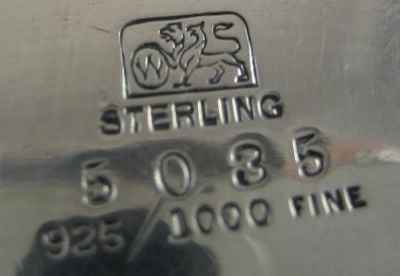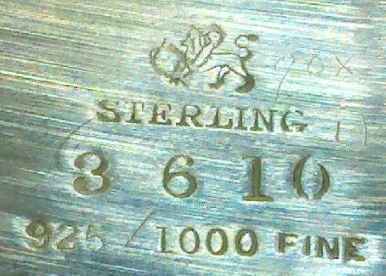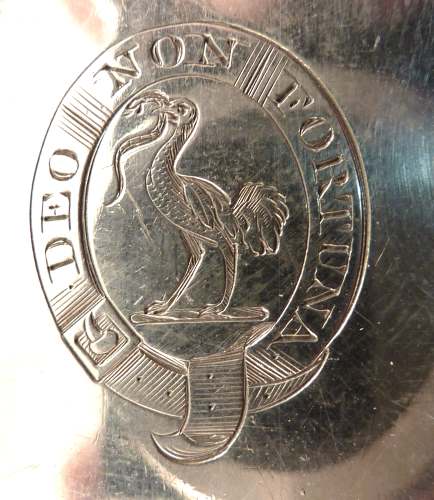YOUR GUIDE TO NOVEMBER NEWSLETTER:
articles
new members
members' window
mail to ASCAS
replies to questions
a page per month
a silversmith per month
a word per month
a book on my shelf
a crest per month
a year per month
contributors to this Newsletter
search engine
disclaimer and privacy policy
A new article for ASCAS website
Steve Cox presents:
Indian Trade Silver in the Americas

Indian Trade Silver is unlike most other forms of silver collecting in the since that by definition it has a beginning and an ending. The proper definition itself is almost unknown. The term trade silver was applied to any item that possessed a high polish and was used as a decoration, or for barter. This could include items made of lead, pewter, brass, tin, silver and rarely even gold.
It is a complex field of interest, and few people invest the time required to educate themselves in the field of collecting. It takes years of intense research and hands on detailed examination of collections to become proficient just in authentication.
Knowledge in metals, manufacturing techniques, trade history, cultural association, maker marks, and much more is required before one may find it safe to collect trade silver with any degree of success. To further complicate collecting trade silver it has no relative value, almost every piece is unique.
With that said, like other rare collectables the vast amounts of counterfeits and authentic reproductions on the market can still lead to heart breaking moments......
click here

New members
Welcome to new ASCAS members:
Serge Chauliaguet - France
Luis Couto-Soares - Portugal
Francis Johnson - England UK
Gerard Rimmer - England UK
Mail to ASCAS:
e-mail
silverassociation@yahoo.it
Jayne Cotten writes:
...Attached are photos of an antique silver repoussť, fret work, dish. It acid tests for .999 silver.
I have searched for a match of the hallmarks and the closest I've achieved relates to the axe tax mark associated with the Netherlands 1853-1927. Can anyone identify the additional marks of the windmill and others?
Many thanks,
Jayne Cotten
It's a typical Hanau silver made in Germany at the end of 19th/early 20th century.
The maker is Georg Roth, active in Hanau 1891-c.1920. See the article about Hanau silver in our website at http://www.ascasonline.org/articolo13.html
Giorgio Busetto
Charles C. Cage writes
Regarding Larry Elmquist's attractive server in October newsletter, I can identify the marks as follows:
1) Two Maltese crosses, crowned - the city mark of Gdansk [Danzig], Poland:
2) W. - the assayer's mark of Gottlieb Ephraim Wulsten, this mark used 1834-1835 and 1837-1839:
3) STUMPF - Although this particular maker's mark is not recorded in either standard reference (Czihak or Gradowski), it is certainly that of Carl Moritz Stumpf (1810-1894; Master 1832), a very prolific Gdansk manufacturer.
This seems to confirm the family history; Gdansk was a large Jewish center in pre-war Poland.
Charles C. Cage
References:
Micha Gradowski, Znaki Na Srebrze [Marks on Silver] (Warsaw: Wydawnictwo Naukowe Pwn, 2001). pp. 69-79, marks 16 & XL
Micha Gradowski & Agnieszka Kasprzak-Miler: Goldsmiths of Northern Poland, Part I: Provinces of Pomerania, Western Pomerania and Warmia-Mazury (Warsaw: Wydawnictwa DiG, 2002), p. 153, maker G659. :
In this column we presents a page obtained from makers'
brochures, books, auction catalogs, advertising or whatever
other printed paper, related to silver, that may be of interest
for ASCAS members.
The images will be published at a "low resolution" level and for
private and personal use only.
This column is published under the kind permission of Giorgio
Busetto's website
OTHER SILVER ADVERTISEMENTS

This month ASCAS presents an 1891 advertisement of
ROBERT PRINGLE & CO
The business was founded in London by Robert Pringle (I) in 1835.
The activity was continued by his son, Robert Pringle (II). In c.1882 the firm was changed to Robert Pringle & Co.
In 1931 the firm was converted into a limited liability company under the style of Robert Pringle & Sons (London) Ltd.
ROBERT PRINGLE: HISTORY & MARKS
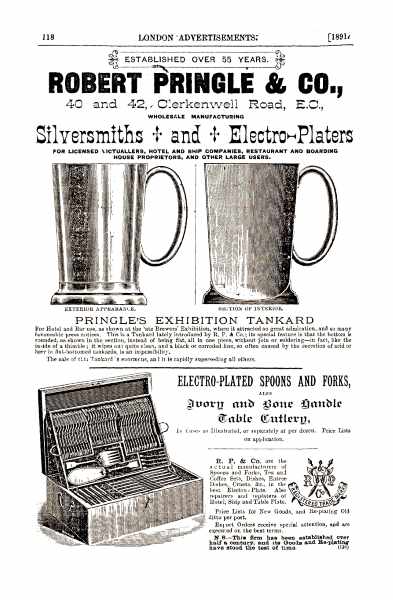
In this column we present an abstract from a page of the "What is? Silver Dictionary"
courtesy of

 EUROPEAN COUNTRIES SILVER AND GOLD HALLMARKS
EUROPEAN COUNTRIES SILVER AND GOLD HALLMARKS
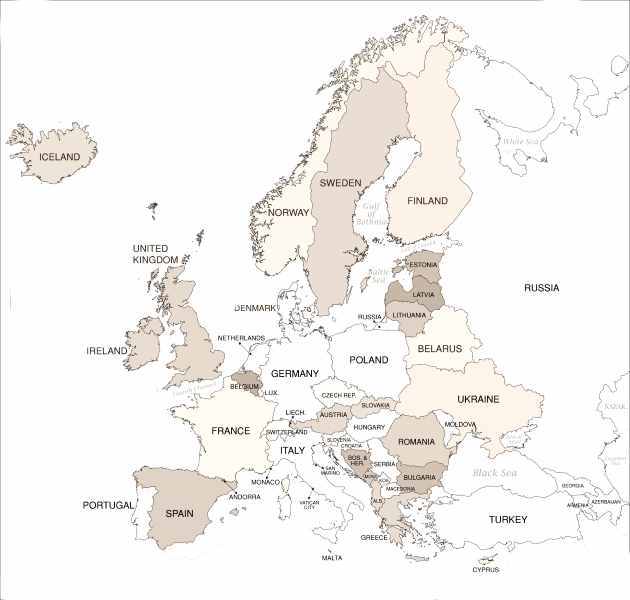
A silver or gold object that is to be sold commercially is, in most countries, stamped with one or more hallmarks indicating the purity of the metal and the mark of the manufacturer or silversmith
Other marks can indicate the date of manufacture and additional information about the piece.
In some countries, the testing of precious metal objects and marking of purity is controlled by a national assay office.
Depending on the national legislation the use of hallmarks may be compulsory, voluntary or provided by a manufacturer's declaration.
The word "HALLMARK" derives from the fact that, since the 16th century, precious metals were sent to the London Goldsmiths' Hall for testing to ensure that the correct standard of silver had been used. The Goldsmiths' Hall was the headquarters of the Goldsmiths' Company and the home of the Assay Office. MORE...
In this column
we present marks, information and history of silversmiths and
silver manufacturers.
This column is published under the kind permission of Giorgio
Busetto's website

WHITING MANUFACTURING COMPANY
Whiting Manufacturing Co traces its origin to the firm Tifft & Whiting formed in 1840 by Albert C. Tifft and William Dean Whiting.
After the retirement of Tifft the firm changed to Whiting & Gooding (& Co) in 1853, Whiting Fessenden & Cowan (1858), Tifft Whiting & Co (1859, re-entering of Tifft), Whiting Cowan & Bowen (1864) until its forming as Whiting Manufacturing Co in 1866.
The factory, located in North Attleboro, Massachusetts, was destroyed by a fire in 1875. What was salvaged by the ruins was acquired by F, Jones and the production transferred to New York.....
MORE...
In this column we
present images and descriptions of Crests and Mottoes of British,
Irish and Scottish families as engraved on silver items.
This column is published under the kind permission of Giorgio
Busetto's website

FAMILY CRESTS: LIST OF NAMES
ILLUSTRATED DIRECTORY OF FAMILY CRESTS
HARRISON
The crest of Harrison family, Rutland
The Latin motto is 'Deo, non fortuna' (Through God, not by chance)
The crest is 'an ostrich, in mouth a snake'
The crest was found on a silver soup ladle hallmarked London, 1816, makers Samuel Godbehere, Edward Wigan & James Boult (entered 1800)

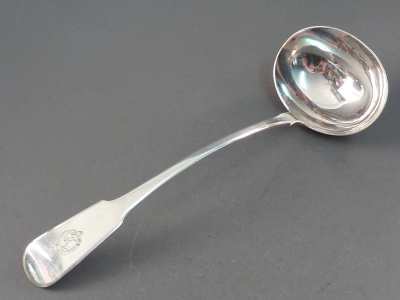
DISCLAIMER AND PRIVACY POLICY
ASCAS is a community of people having a common
interest in antique silver.
It is a non-profit association without commercial links.
Membership is open to whomever has a true interest in
this subject matter.
ASCAS has no real property and no fees are requested nor
accepted from members.
ASCAS keeps in touch with its members only through
periodical newsletters, e-mails and web-site updating
and ignores and is not responsible for any other
activity pursued by its members.
Likewise, ASCAS is not responsible for opinions,
evaluation and images displayed, and in any form
published or supplied for publication, by its members
who, in any case, maintain the property of their works
and assure the respect of national and international
legislation about Intellectual Property.
ASCAS does not have the full addresses of its members (only
town, country and e-mail address are requested for
membership).
ASCAS handles and protects with care its members' e-mail
addresses, will not disclose the addresses to third
parties, will use this information only to reply to
requests received from members and for communications
strictly related to its activity.
These rules are expressly accepted by submitting the
membership request.
|
|


















